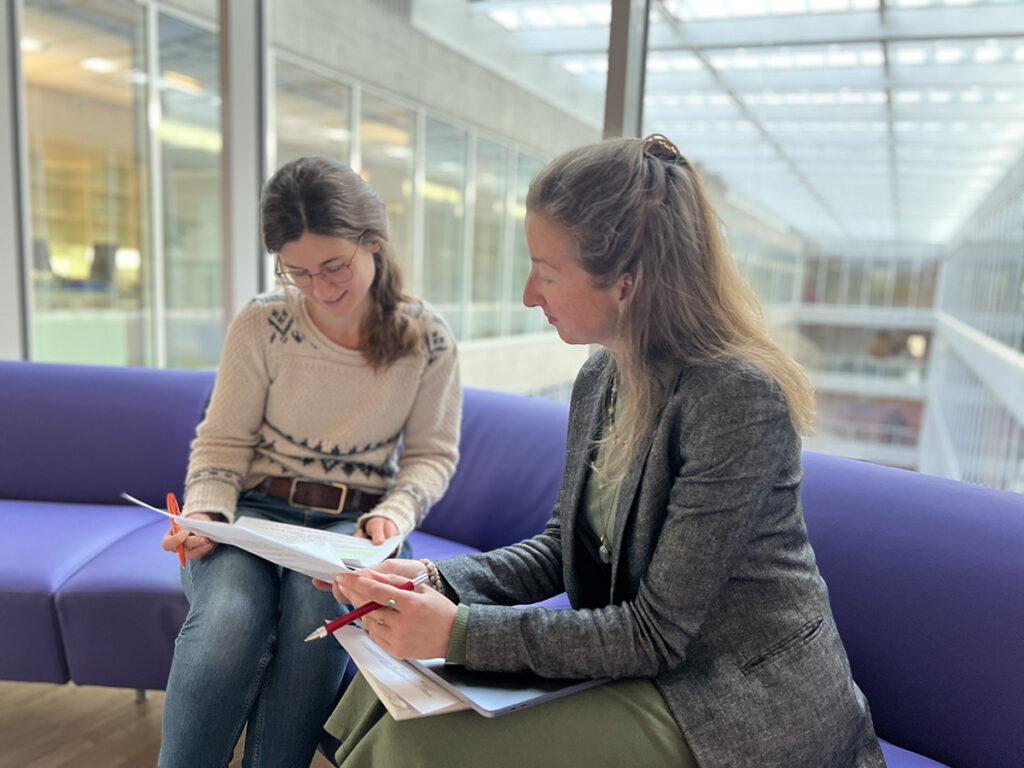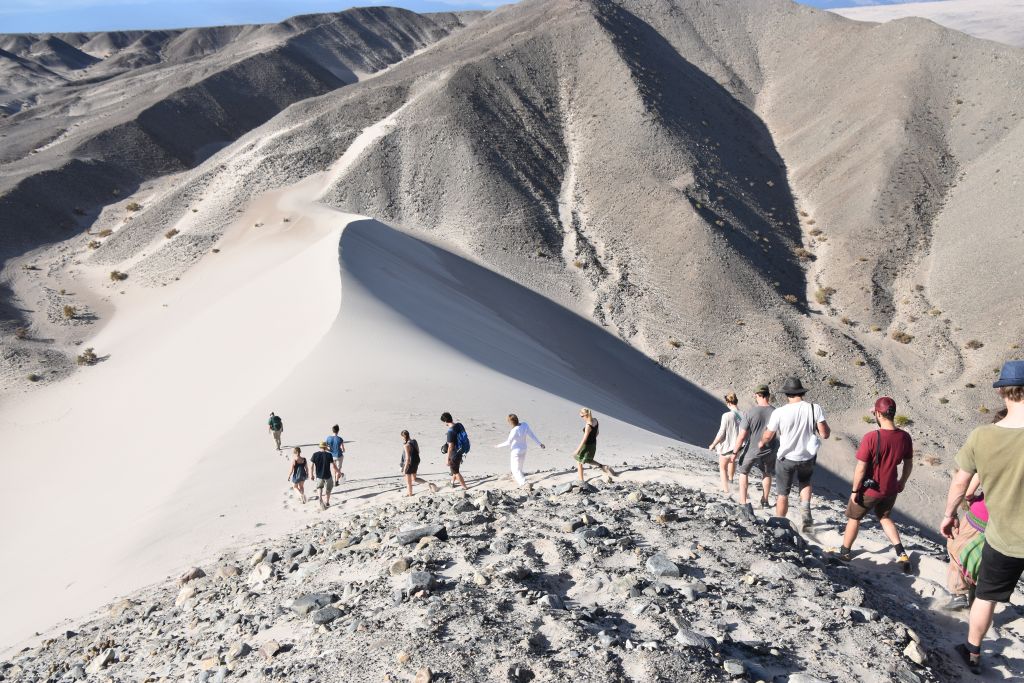Cette publication est également disponible en :
Français

Fieldwork constitutes a crucial element in teaching and research within Geography and the Earth and Environmental Sciences. It has a pivotal role in shaping a student’s career trajectory and for accomplishing research objectives. Recognizing its significance has raised the following concern: how can we make fieldwork as inclusive and accessible as possible? In a collaborative effort to address this issue, Floreana Miesen and Natalie Emch are actively engaged in a working group tasked with crafting a toolkit to help make fieldwork more accessible. The aim is to come up with solutions that respond to the various needs, by involving the entire student and research community in the reflection process.
Can you say more about this working group “A good practice guide for fieldwork”?
N.E : The working group endeavors to collect input and advice from members of the FGSE across different perspectives and institutes. Our aim is to produce a Handbook of Good practice – a useful resource for both teaching staff and students. It will be a support document for preparing and organising any type of field camp, whether for teaching or research purposes. Unlike a set of rigid rules or directives, the Handbook aims to inspire and guide. It will cover aspects such as communication, sanitary installations, accessibility to material to give some examples. We would like the community to know there is a support structure at the faculty to address these challenges related to fieldwork.
What will be the content of this handbook?
F.M. : The document is structured around simple questions for teaching staff and participants. They encompass safety and well-being issues. For examples: “Have the participants been informed about the daily schedule, the mobile phone network coverage, local customs…?” – “Have participants been informed of the equipment to bring and how to obtain it?” – “As a participant, am I uneasy about an issue I wish to raise with the organisers? Is there any constraints I could to share with the organisers, such as family care responsibilities?”
The important point is to foster timely communication and open dialog between organisers and participants. This initiative seeks to raise awareness about the fact that students may not dare to express significant concerns, such as safety and personal needs. It’s central to avoid assuming that everyone has a sleeping bag, has been to the mountain tops or is free of family duty.
“The aim of the document is to remove barriers that can hinder or prevent participation and learning, and to create safe and pleasant conditions for everyone.”
Floreana Miesen
Work in progress – your input is welcome!
You are a student, a teacher, a researcher at the FGSE and wish to share your experience on the field? Or do you simply want to know more? Feel free to contact the working group ce-fgse@unil.ch.
We are still collecting input from different perspectives and across the three FSGE institutes. For instance, we welcome suggestions about:
- What type of support is needed to organise a successful field camp? (Training in conflict management, in how to deal with anxiety…?)
- As a participant, what information do you need to prepare a field camp with confidence?
Why this project for a good practice guide?
N.E. : UNIL is committed to improve the well-being of its members and the inclusion of people, regardless of their gender, ethnic or migratory background, disability… This work is hence a contribution to UNIL’s ambition to fight inequality. Issues of safety and personal integrity in the field are part of UNIL’s action plan for equality, diversity and inclusion, and our working group is part of this commitment.
“When people feel safe, respected, valued, supported, they are able to actively contribute.”
Natalie Emch
Natalie Emch, why is this project important to you?
N. E. : When I arrived in 2022, a workshop had just taken place at FGSE with Ann Rowan (University of Bergen, Norway) (March 2022), which addressed the question of inclusivity in fieldwork. Feedback from the students highlighted that fieldwork was highly valued, as it enabled them to acquire scientific and practical know-how that was distinct from that of the classroom.
However, some students highlighted their anxieties, their specific needs and lack of clarity around responsibility and field conditions which can interfere with their learning. We observe that due to hierarchical structures and the fact that students are evaluated they can feel shy to speak up.
This led to the decision to create a working group to address this issue and develop a handbook for good practices. As the EDI officer of FGSE, I have embraced this project and I hope this work will attract more diversity in the field.

Floreana Miesen, why is this project important to you?
F. M.: I enjoy everything related to fieldwork. During my studies in Geography in Germany, I had the opportunity to participate in a lot of field courses and field research. I felt it really was one of the best ways to learn. Fieldwork was my motivation to apply for this position at IDYST. I still appreciate the variety of projects and approaches in the field. However, I have noticed that students sometimes face challenges. For example, they can feel overwhelmed by the gap between their experience of hiking with friends and the demands of working in mountainous terrain.
I am convinced that to focus on the learning objectives, students should not be preoccupied with managing challenges related to personal needs exacerbated by a field course. By addressing issues – like physical fitness requirements, personal constraints or financial limitations – this handbook proposes strategies to lower entry barriers.
“I would like to convey my enthusiasm for field work, and ensure that more people can enjoy fully this experience.”
Floreana Miesen
Links
- Page EDI de la FGSE
- Plan d’action EDI UNIL
- Geodes (GEOsciences Diversity Equality Switzerland)
- A students’ wish list for field courses that leave no one behind, Léa Rodari et Floreana Miesen, EGU Blogs, novembre 2022
- Inclusive fieldwork: issues to care about, Léa Rodari et Floreana Miesen, EGU Blogs, novembre 2022
A multi-pronged FGSE approach of welfare and security
The FGSE is committed to protecting its students and employees and to improving study and research conditions from all points of view, through various bodies (Health and Safety Committee, Equality Commission, Ethics Commission, internal support for employees), and through more informal steps such as the production of this Handbook.
This Handbook of Good Practices for Fieldwork in the making is primarily designed as a list of recommendations, and does not have a binding scope like the two Décanat Directives for fieldwork (Directive à l’intention des membres de la FGSE sur la sécurité et les mesures de protection pour le travail de terrain) and off-campus activities (Directive FGSE pour les travaux de recherche impliquant des déplacements à l’étranger).
The Fieldwork Directive requires each person involved in fieldwork to carry out an adequate risk assessment beforehand, in an autonomous and personal way. It is more focused – although not only – on physical safety in field camps, while the Handbook of Good Practice focuses on the emotional safety and personal integrity of people participating in camps or excursions, so as to make them more accessible.
The future Handbook also develops, deepens and thus very usefully complements the concepts that appear briefly in the second directive, devoted to the elements to be taken into account in general when planning off-campus activities.
Leave a Reply